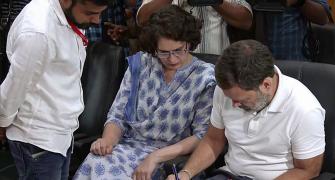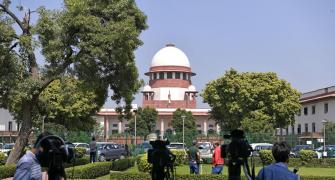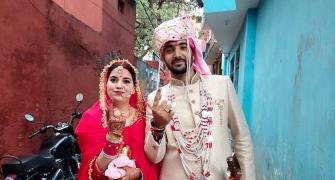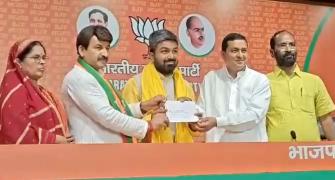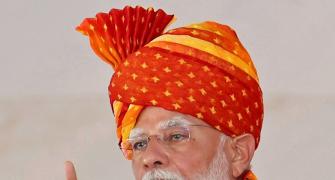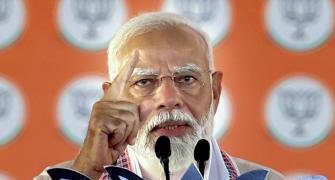Lalita Kaul, professor of nutrition at the department of community health and family practice, Howard University, Washington, DC, has been appointed the national spokesperson for the American Dietetic Association.
She will be the first Indian American to serve in this position in this organisation.
ADA is the US' largest organisation of food and nutrition professionals, which has nearly 65,000 members (www.eatright.org/Public).
Her appointment coincides with the publication of her first book, Multidisciplinary Approach to the Management of Obesity -- a handbook for physicians and health care professionals that has been touted as a scientific alternative to many failed commercial weight-loss methods.
 Kaul, who came to the United States in 1962, and for over two decades has taught nutrition at the university level, told rediff India Abroad, "I am just so very proud and excited at this wonderful opportunity to speak on behalf of the ADA because even when I teach, that's our Bible -- the ADA Handbook."
Kaul, who came to the United States in 1962, and for over two decades has taught nutrition at the university level, told rediff India Abroad, "I am just so very proud and excited at this wonderful opportunity to speak on behalf of the ADA because even when I teach, that's our Bible -- the ADA Handbook."
A practicing dietician, former director of the clinical nutrition oncology program at the Howard University Cancer Center and director of its nutrition clinic and the author of some 40 papers, Kaul says she is "a low-profile person and, more, an academician. I write, I speak, so I didn't expect this position, and so, when I got the call from the president of the ADA offering me the position, I was totally thrilled."
This nutrition expert sees her appointment as an opportunity.
"I am passionate about educating people on nutrition. There are a lot of food habits that people have to modify and I want to tell people what is right for their heart. By being a national spokesperson for ADA it carries extra weight and credibility. It's such a great opportunity to get the message across about good eating habits and nutrition out to the public because now I have a forum."
Kaul -- daughter of the late journalist-turned-diplomat Zind Lal Kaul, who after a career with All India Radio, joined the foreign service and served in Cairo, Algiers, Tokyo, and New York -- attended high school in Cairo and went to Hunter College, New York City, for two years when her father was posted in New York. She studied for a degree in nutrition and then did her master's at Howard University. She has a PhD in nutrition, biochemistry and physiology from the University of Maryland, College Park, Maryland. She became acknowledged as a health consultant while working with the White House Health Care Information Center and at the National Institutes of Health, Bethesda, Maryland, a medical research agency of the US government.
She was recently been quoted in The Washington Post and The Washington Times on the issue of whether candy-makers were right when pitching chocolate as a health food and on the soft drink industry's guidelines that call for less soda in schools.
Kaul and her co-authors, her Howard University colleagues Dr Joseph J Nidiry and Dr Henry W Williams, Jr, wrote their handbook on obesity to address 'the obesity epidemic in this country, which is leading to a markedly and dangerously increasing incidence of diabetes, hypertension.'
"I felt I had so much information to share that even though it's called a handbook for physicians and healthcare professionals, it can be used by lay people -- because it's such an easy read and the message is that diet alone is not the only answer, especially in middle-aged people who may eat very little but still may not be free of the disease," says Kaul, who is married to a cardiologist.
She says, the book -- dedicated to her daughter, Kavita, 22, a recent Duke University graduate with a degree in anthropology, who is preparing to go to medical school -- "is a way to fight this disease of obesity by coalescing several factors. It's your food, diet, exercise, the environment, the support systems of one's family and friends, everything that has to be combined in various proportions."
According to Kaul obesity could very well become an epidemic with future generations of Indian Americans too because adult type-2 diabetes, which was showing up in children at younger ages, was not confined to white and African Americans alone, but was also showing up among Asian Americans, including Indian Americans.
She has nearly completed two more books -- one on nutrition and diet for Asian Americans, and the other on cancer and nutrition.
Kaul says the book on nutrition for Asians has details how Indian Americans and other Asians could make their recipes healthier without losing out on the taste.
"It's a book that zeroes in on prevention, treatment and recipes," she adds.

